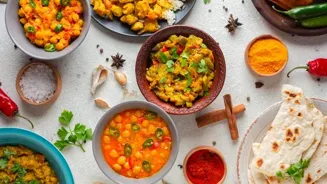Explore how the Indian diaspora reshapes global cuisine, blending flavors, techniques, and traditions. From spices to vegetarianism, discover the culinary impact worldwide
The Indian diaspora, spread across
the globe, has not only enriched various societies with its culture and traditions but has also significantly impacted global cuisine.
From the bustling streets of London to the vibrant neighborhoods of New York, the flavors of India have found a home, creating a delightful culinary exchange that has transformed the way the world eats.
This influence extends beyond just Indian restaurants; it has permeated mainstream cooking, introducing new spices, techniques, and vegetarian options that have revolutionized culinary landscapes worldwide.
The journey of Indian food across borders is a testament to the adaptability and enduring appeal of its diverse culinary traditions.
Introduction of Indian spices globally revolutionizes cuisine diversity
The introduction of Indian spices into foreign lands is perhaps the most prominent impact. Turmeric, cumin, coriander, ginger, and chili peppers, once exotic ingredients, are now pantry staples in many households globally.

These spices not only add unique flavors and aromas to dishes but also offer numerous health benefits, aligning with the growing consumer interest in healthy eating.
The integration of these spices has led to the creation of fusion cuisines, blending Indian flavors with local ingredients and cooking styles.
This fusion has resulted in exciting and innovative dishes that cater to diverse palates, further solidifying the place of Indian cuisine in the global culinary scene. This exchange allows different groups to experience cultural diversity.
Indian vegetarian cuisine's global influence due to rich history and diverse recipes
The increasing popularity of vegetarianism across the world is another aspect of Indian culinary influence. India, with its long history of vegetarianism, has contributed a wealth of vegetarian recipes and cooking techniques.
Dishes like vegetable curries, lentil soups, and rice preparations have become increasingly popular among vegetarians and non-vegetarians alike.
The emphasis on fresh vegetables, legumes, and grains in Indian vegetarian cuisine has made it an attractive and accessible option for those seeking healthier and more sustainable diets. Its influence can be seen in the explosion of vegetarian only restaurants in most countries now.
Indian cooking techniques, like tandoor and lentils, influence global cuisine
Furthermore, Indian cooking techniques, such as tandoor cooking and the use of various types of lentils and beans, have been adopted by chefs worldwide.
The tandoor oven, traditionally used for baking bread and grilling meats, is now utilized to cook a wide range of vegetables and other dishes, adding a unique smoky flavor.
The diverse range of lentils and beans used in Indian cuisine has also introduced new textures and flavors to global cooking, providing versatile and nutritious alternatives to meat. These techniques, often passed down through generations, have made their mark on various culinary traditions.
Indian diaspora innovates with local ingredients in global cuisine
The culinary exchange is not a one-way street. The Indian diaspora has also adapted and incorporated local ingredients and techniques into their cooking, resulting in new and exciting variations of traditional Indian dishes.

For example, Indian chefs abroad may use local vegetables and fruits to create unique curries or fusion dishes that reflect the local culinary landscape.
The ability to adapt and innovate has been key to the success of Indian cuisine in the global market and has allowed it to appeal to a wider audience. The ability to incorporate new ideas into the mix has made Indian cuisine a global phenomenon.
The Indian diaspora shapes global cuisine through cultural exchange and culinary innovation
The impact of the Indian diaspora on global cuisine is a continuing story of cultural exchange and culinary innovation. As more and more people experience the flavors of India, its dishes and techniques will continue to evolve and influence the way the world eats.
The increasing interest in healthy eating, vegetarianism, and sustainable food practices further reinforces the relevance and appeal of the Indian cuisine.
The enduring legacy of the Indian diaspora is not just about spreading flavors; it is about spreading a culture, a way of life, and a deep appreciation for the richness and diversity of food. The next generation will continue to keep the tradition of their cuisine thriving.













![[WATCH] T20 World Cup 2026: Gautam Gambhir hosts dinner for Team India players ahead of Namibia clash](https://g-mob.glance-cdn.com/public/fc/image/7gXS1xdhs5Q0.webp)


